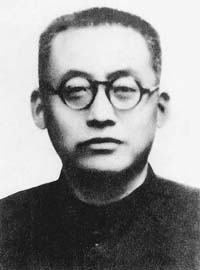
Back تاو زينغزهي Arabic تاو زينجزهى ARZ Tao Xingzhi German Tao Xingzhi French 陶行知 Japanese 타오싱즈 Korean 陶行知 Chinese
Tao Xingzhi | |
|---|---|
| 陶行知 | |
 | |
| Born | October 18, 1891 |
| Died | July 25, 1946 (aged 54) |
| Nationality | Chinese |
| Alma mater | University of Illinois Columbia University |
Tao Xingzhi (Chinese: 陶行知; pinyin: Táo Xíngzhī; Wade–Giles: T'ao Hsing-chih; October 18, 1891 – July 25, 1946), was a renowned Chinese educator and reformer in the Republic of China mainland era. He studied at Teachers College, Columbia University, and returned to China to champion progressive education. His career in China as a liberal educator was not derivative of John Dewey, as some have alleged, but creative and adaptive. He returned to China at a time when the American influence was zesty and self-confident, and his very name at that time (zhixing) meant "knowledge-action," reflecting the catch-phrase of the Neo-Confucian philosopher Wang Yangming which implied that once knowledge (zhi) had been obtained, then action (xing) would be easy.[1]
- ^ "T'ao Hsing-chih," in Howard Boorman, ed. Biographical Dictionary of Republican China Vol IV, pp. 243–248[ISBN missing]